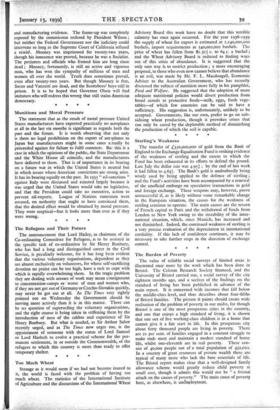Strange as it would seem if we had not become
inured to it, the world is faced with the problem of having too much wheat. The statistics of the International Institute of Agriculture and the discussions of the International Wheat Advisory Board this week leave no doubt that this terrible calamity has once again occurred. For the year 1938-1939 the supply of wheat for export is estimated at 1,14o,000,000 bushels, import requirements at 54o,000,000 bushels. The price of wheat has fallen from 51.314 c. to 64 c. a bushel ;• and the Wheat Advisory Boaid is reduced to finding ways out of this crisis of abundance. It is suggested that the only sure way is to restrict production ; a more encouraging proposal, to those who even now cannot believe that abundance is an evil, was made by Mr. F. L. Macdougall, Economic Adviser to the Australian Government, who has recently discussed the subject of nutrition more fully in his pamphlet, Food and Welfare. He suggested that the adoption of more adequate nutritional policies would divert production from bread cereals to protective foods—milk, eggs, fresh vege- tables—of which few countries can be said to have a sufficiency. His suggestion is, unfortunately, unlikely to be accepted. Governments, like our own, prefer to go on sub-, sidising wheat production, though it provokes crises that can only be cured by the deplorable method of diminishing the production of which the soil is capable.
* * * *






































 Previous page
Previous page